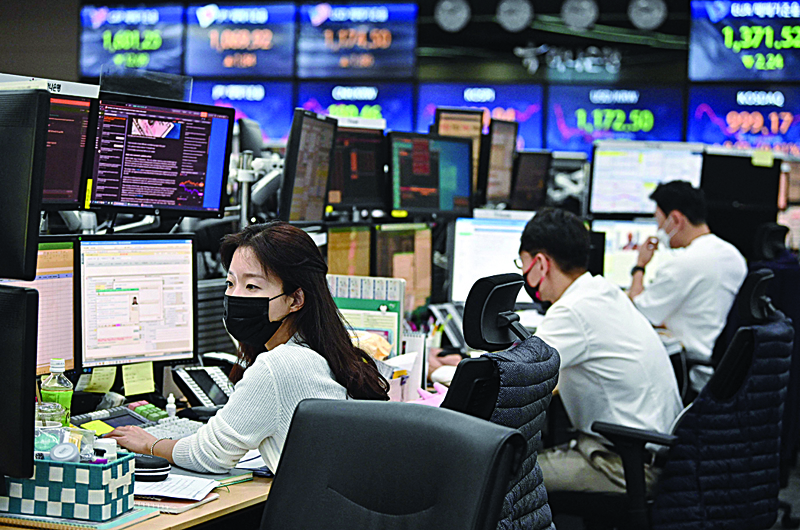 SEOUL: Currency dealers monitor exchange rates in a trading room at KEB Hana Bank in Seoul. - AFP
SEOUL: Currency dealers monitor exchange rates in a trading room at KEB Hana Bank in Seoul. - AFPHONG KONG: Asian markets were mixed yesterday, with news that Joe Biden's multi-trillion-dollar spending plans were edging closer providing another colossal boost, but the optimism was offset by profit-taking after a strong start to the week. The US Food and Drug Administration's decision Monday to give full approval to Pfizer-BioNTech's vaccine has given a huge lift to sentiment and eased worries about the fast-spreading Delta variant in the world's top economy.
That came as some countries including the United States see infection spikes easing, while China appears to have overcome a weeks-long outbreak. Still, others such as Australia, Japan, and New Zealand remain in a tough battle with the disease, forcing them into containment measures. The FDA move "is paving the way for organisations to mandate vaccines for workers and thus lift vaccination rates higher", said National Australia Bank's Tapas Strickland.
"China's Delta outbreak also appears to be under control with two consecutive days of no new domestic cases (only one suspected case), while the PBoC vowed to boost credit support for smaller businesses and the real economy." Wall Street enjoyed another strong day, with the S&P 500 at a record and the Nasdaq topping 15,000 for the first time. Asia picked up the baton but with smaller gains than those enjoyed on Monday and Tuesday.
Shanghai, Seoul, Sydney, Singapore, Wellington, Taipei, Manila, Mumbai, Bangkok, and Jakarta all rose but Tokyo was flat. Hong Kong dipped after rising around three percent in the previous two days. London, Frankfurt, and Paris were all up in early trade. Buying was helped by news that Democrats in the House of Representatives had settled internal differences to push forward Biden's massive spending bill.
Biden bill edges closer
While there remains a long way to go before it hits his desk to be signed, the agreement gets the president closer to realising his near $5-trillion goal for updating US infrastructure and providing much-needed improvements to education, health care, and climate change resiliency. "The House of Representatives is taking a significant step toward making historic investment that is going to transform America, cut taxes for working families, and position the American economy for long-term -- long-term growth," Biden said.
Focus is now on a speech by Federal Reserve boss Jerome Powell to central bankers and economists for the Jackson Hole symposium, with hopes for an idea about its plans for monetary policy with an eye on the Delta mutation's possible impact on growth. However, observers are generally of the view that the disease will only slow the global recovery rather than knock it off course.
"As long as the economic and corporate earnings environments continue to improve, the market is likely to withstand ongoing concerns about the virus and policy," said Lauren Goodwin, economist and portfolio strategist at New York Life Investments. "That said, risks for the market are becoming more balanced as we move throughout the market cycle."
Oil prices edged lower after jumping more than eight percent in the previous two days on hopes for a demand rebound, having suffered hefty selling in recent weeks owing to the Delta variant and China's outbreak, with some suggesting it could break $75 and possibly $80 a barrel. "The oil market is still very tight and with Chinese demand picking up, crude prices only have one way to go after an overdone selloff," said OANDA's Edward Moya. "Crude prices should benefit from declining inventories and as the world's two largest economies start to see a return of normal crude demand." - AFP










